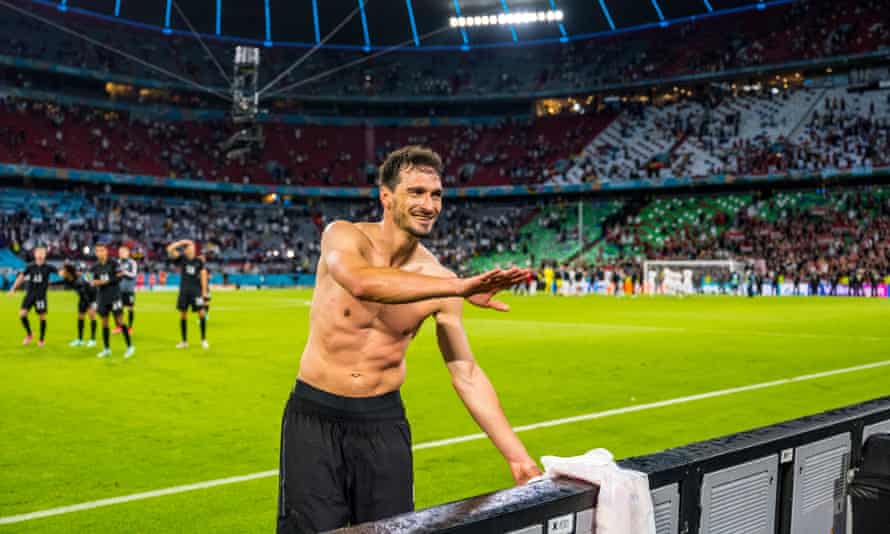For Thomas Müller and Mats Hummels, a climactic night in Gelsenkirchen two and a half years ago seemed an unhappy end. Germany were still struggling to kick their post-World Cup funk and the Netherlands had exacerbated things, scoring twice in the last five minutes to level a Nations League game. Hummels had not been quick enough out to Quincy Promes for the first goal; there was less he could do when Virgil van Dijk volleyed the equaliser. The faintly comical image at full time was of a stony-faced Müller, who had come on in the second half, reluctantly accepting a fist bump from Paule, the Nationalmannschaft’s eagle-costumed mascot.
Within weeks, Joachim Löw pulled the plug on his creaking stalwarts, describing 2019 as “the year of a new start for the national team. We want to give the team a new face.” Müller, Hummels and Jérôme Boateng were no longer to be considered for selection. Oliver Bierhoff, the technical director, explained that Germany had needed to “decide what is best for the team on the way back to the top of the world”.
The German language is yet to develop a 20-letter word for plus ça change but it has got until Tuesday night. Fitness permitting, Müller and Hummels will start against England; both were roused in May for one last dance and it is hard to tell whether their presence at Wembley should be a symbol of power or weakness.
In recalling the pair, Löw said it was necessary to “interrupt an overhaul” and that Germany had been lacking experience, an observation given truth by the six goals Spain put past a flimsy defence last November and the shocking home defeat by North Macedonia in March. It was a fair, if unbecoming, admission that their absence had not produced the expected results. An initial Euro 2020 qualifying win in Amsterdam spoke promisingly but the Dutch would avenge that by scoring four times in Hamburg and Germany came to look rudderless against strong opponents.

Löw had short-term goals in mind, too, given he had recently announced that he would depart after this summer’s competition. He decided Germany lacked the aura, the ability to attract a double-take in the tunnel, that has eased them over the line before. Perhaps he had a point: among the rest of his squad only Manuel Neuer, Toni Kroos and – at a push – Matthias Ginter could offer the dead-eyed stare of World Cup winners. International tournaments have a habit of unlocking long memories, of summoning past ghosts to sow doubt. England, with their more controlled style and theoretically potent frontline, might be clear favourites in the last 16 if there were nothing to muddy the water. Germany, though, have rediscovered an edge when it comes to authority.
That may work to particular effect in Müller’s case. Pundits and former players in Germany have been falling over themselves to suggest he, above anyone, can make the difference between an early exit – and England’s first knockout victory over the Germans since 1966 – and another march towards the business end. Müller is the self-proclaimed “space interpreter” (raumdeuter) but “space designator” may more accurately describe his role in Löw’s final fling. In the buccaneering win over Portugal he was the off-camera presence, the outstretched hand, the bellowing exhortation, directing the waves of attacking play that coursed down either flank. In his absence for the first hour against Hungary, Germany looked weak and confused. His career’s work has been defined by a propensity to ghost in from nowhere and poach. In this gifted but raw side, “Radio Müller” operates more prominently by pulling the strings.
Müller’s eyes will blaze at the sight of England, and the thought of that double in Bloemfontein in 2010, three months into his international career, may sustain many a German hope. Against that, he has not scored at a major tournament since opening the floodgates when Brazil were shamed in Belo Horizonte seven years ago. Löw’s winding-back of the clock could require a fair few turns.
The picture appears less hopeful when it comes to Hummels. He joined Müller among the Golden Ball candidates in 2014 but, unlike his resurgent colleague, he is clearly not the player he was. The own-goal that settled Germany’s opener against France was forgivable, despite its comicality; the way in which Adam Szalai peeled off him to begin a tumultuous night on Wednesday was less so and, whether against physicality or pace, the 32-year-old has struggled.
The Fiver: sign up and get our daily football email.
It is not a dissimilar story for Kroos, who made his Germany debut on the same night as Müller but was spared the enforced two-year break. He was criticised for a lack of energy after the Hungary draw and was certainly slow to close down Roland Sallai as he fed Szalai’s run. The 35-year-old Neuer could not get away without scrutiny, either, given his misjudgment in being beaten to the ball by Andras Schafer later on. It is a long time since Germany’s veterans have offered any of their old certainties.
The new wave, though, are yet to bring any either. That is why Löw is banking on Müller and Hummels facing England down, dragging their team upwards and applying bottlefuls of the old spirit. “I feel like chasing titles in the summer,” Müller said in March after Bayern Munich had beaten Borussia Dortmund in front of a pensive Löw. “I’m definitely ready.” He may as well have been rubbing his hands together while speaking: for all the imperfections of Löw’s late compromise, the fire may yet rage well into July.
from Football | The Guardian https://ift.tt/3jiNv2S
via IFTTT

No Comment